Tras años construyendo sitios web con WordPress, hemos aprendido lo importante que es tener una configuración local de WordPress en tu ordenador.
Tener WordPress en tu máquina personal te permite experimentar con nuevas funciones sin poner en riesgo tu sitio web, profundizar en el desarrollo de WordPress e incluso crear sitios web completos antes de que salgan a la luz. Es como tener una caja de arena privada para todos tus proyectos de WordPress.
Si eres usuario de Windows, existen numerosas formas de configurar WordPress localmente. Pero lo hemos reducido a los dos métodos más sencillos. En esta guía, te mostraremos cómo instalar WordPress fácilmente en un ordenador con Windows, independientemente de la versión que estés utilizando.
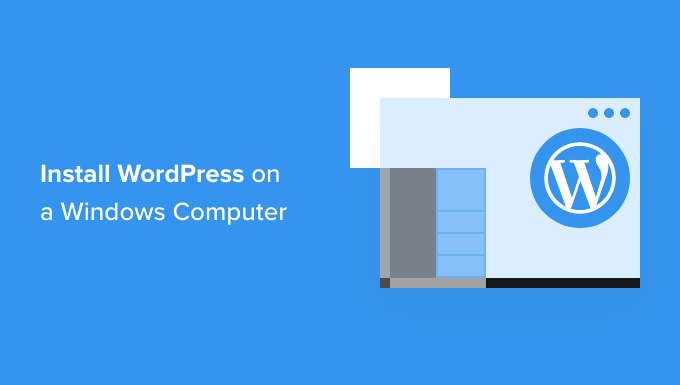
¿Por qué debería instalar WordPress en Windows?
Si eres usuario de Windows, instalar WordPress localmente en tu ordenador te ofrece varias ventajas.
Una instalación local de WordPress crea un entorno de pruebas que no afecta a su sitio web. Esta configuración, a menudo llamada servidor local o localhost, es tu patio de recreo personal para WordPress.
Los desarrolladores de WordPress utilizan habitualmente instalaciones locales para su trabajo. Por ejemplo, pueden utilizarla para experimentar con nuevos plugins o temas o probar el sitio antes de actualizarlo al editor de bloques Gutenberg.
Pero no es sólo para los profesionales. Si eres nuevo en WordPress, una configuración local es perfecta para aprender. Puedes explorar funciones, probar temas y plugins, y experimentar libremente sin preocuparte de romper un sitio activo.
Es importante tener en cuenta que cuando instalas WordPress localmente en Windows, sólo tú puedes ver el sitio. Si quieres crear un sitio web público, necesitarás un nombre de dominio y alojamiento web.
Ahora, técnicamente, puedes instalar WordPress en Windows usando XAMPP, y hemos escrito un tutorial sobre ello antes.
Dicho esto, hemos encontrado 2 formas aún más sencillas que XAMPP para configurar un entorno local de WordPress, por lo que son ideales para principiantes o usuarios que necesitan crear un sitio local rápidamente. Puedes hacer clic en el enlace de abajo para saltar al método que te interese:
Método 1: Instalar WordPress en Windows con Studio (rápido y sencillo)
Para el primer método, utilizaremos Studio. Es un software local de WordPress hecho por Automattic, la empresa que gestiona y dirige WordPress.com, que es un constructor de sitios web basado en el software de WordPress.
Hablaremos primero de este método porque es mucho más rápido y sencillo de seguir, lo que lo hace perfecto para los principiantes.
En primer lugar, tienes que abrir el sitio web Studio by WordPress.com. A continuación, haz clic en el botón “Descargar para Windows”.
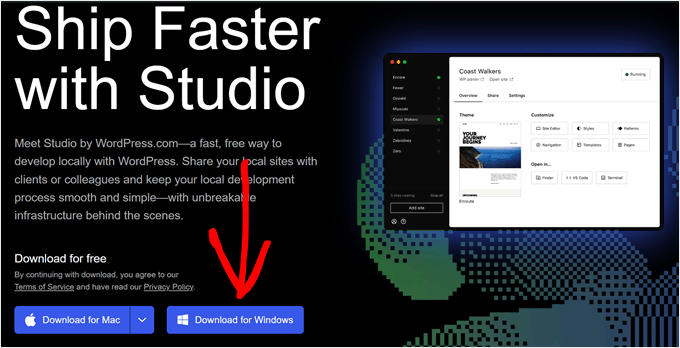
Una vez hecho esto, sólo tienes que abrir el archivo descargado para iniciar la instalación.
Aparecerá una ventana emergente que le indicará que se está instalando la aplicación.
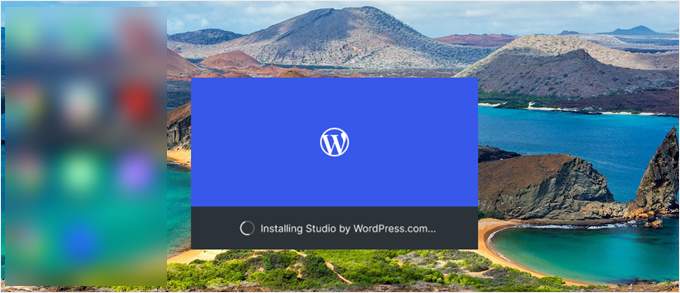
Una vez hecho esto, puede añadir su primer sitio.
Para ello, introduce el nombre de tu nuevo sitio local de WordPress y haz clic en “Añadir sitio”. Puedes nombrar el sitio como quieras siempre que te ayude a identificarlo fácilmente.
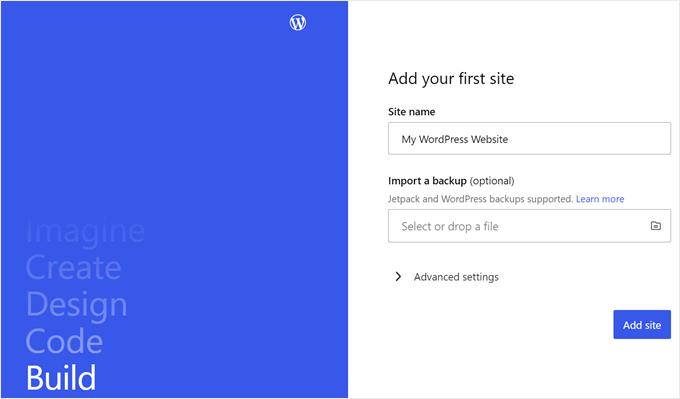
Ahora debería ver el escritorio de WordPress local.
Para acceder a tu escritorio de WordPress y editar tu sitio web, sólo tienes que hacer clic en el botón “Inicio” situado en la esquina superior derecha. De este modo, podrá acceder a su sitio web local desde su ordenador.
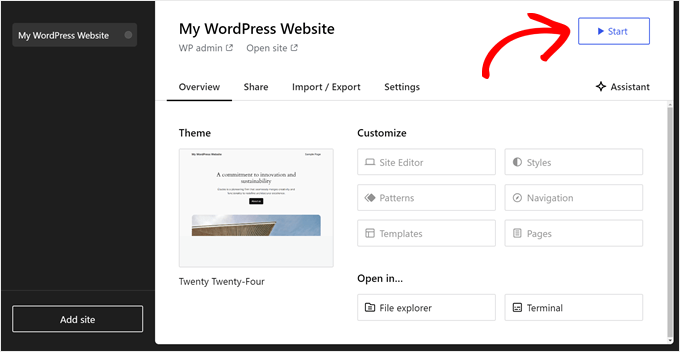
Una vez que el botón “Iniciar” cambie a “Ejecutando”, puede hacer clic en el enlace “WP Admin” en la parte superior izquierda de la página.
Esto le llevará a su página local de administración de WordPress.
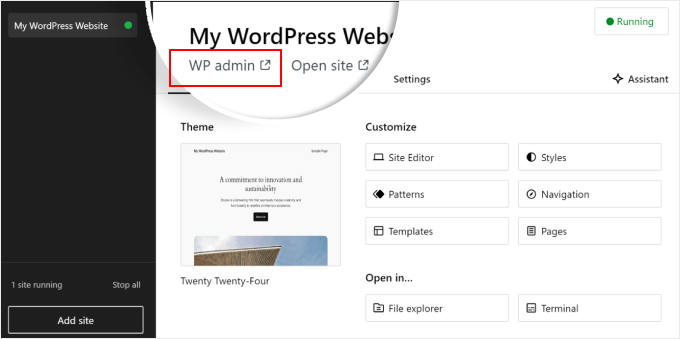
Y eso es más o menos todo para la configuración. Vamos a explorar los otros ajustes que pueden ser necesarios a medida que construye su sitio web local.
Como puedes ver en la pestaña ‘Visión general’, puedes acceder inmediatamente al menú completo del editor de WordPress directamente desde el escritorio de Studio. También puedes hacer clic en “Explorador de archivos” para abrir las carpetas y archivos de tu sitio web de WordPress y hacer clic en “Terminal” para administrar tu sitio web mediante WP-CLI.
Si cambias a la pestaña “Compartir”, puedes acceder a tu cuenta de WordPress.com, clonar tu sitio web local y subirlo a los servidores de WordPress.com. Esto hará que el sitio clonado esté online temporalmente, lo que resulta útil para compartir sitios de demostración con tus clientes o miembros del equipo.
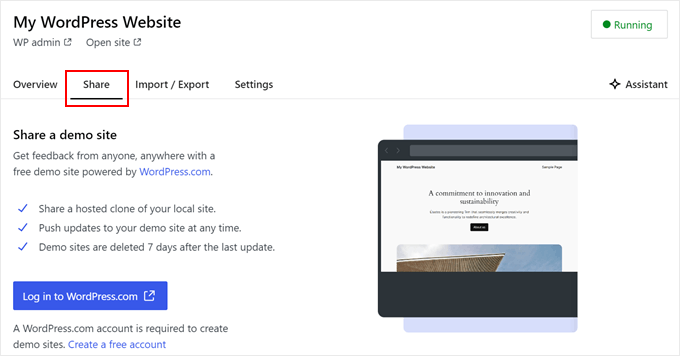
A veces, es posible que desee iniciar sesión en su sitio web local directamente a través de su navegador en lugar de utilizar Studio. En ese caso, necesita conocer sus credenciales de wp-admin.
Para encontrarlos, puede cambiar a la pestaña “Configuración” y encontrar allí su nombre de usuario, contraseña y URL de inicio de sesión de administrador de WordPress.
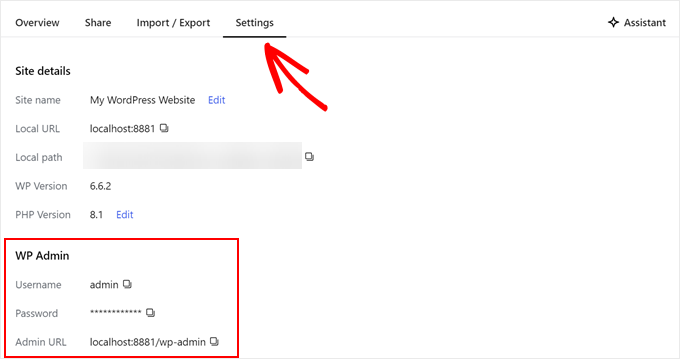
Otra característica interesante de Studio es su chatbot de inteligencia artificial integrado, con el que puedes comunicarte pulsando el botón “Asistente”.
Aquí puedes pedir ayuda a Studio para tareas como actualizar todos tus plugins a la vez, actualizar la versión principal de WordPress o crear código para un bloque personalizado.
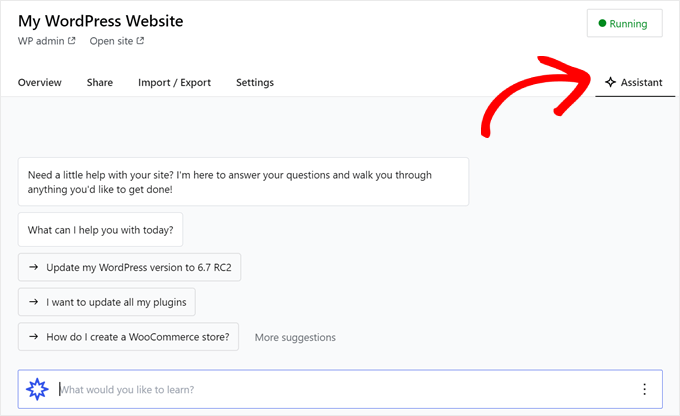
Cuando hayas terminado de trabajar en tu sitio local, sólo tienes que pasar el ratón por encima del botón “En ejecución” de la esquina superior derecha hasta que ponga “Detener”.
A continuación, haga clic en el botón para detener el sitio web.
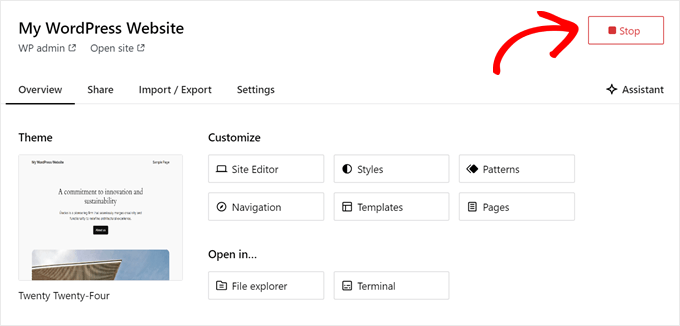
Una desventaja de Studio es que no puedes configurar el entorno de WordPress a tu gusto. Esto significa que tienes que utilizar la versión de PHP, el servidor web y la base de datos que se han preseleccionado para ti.
Esto puede ser un inconveniente si necesitas probar tu sitio web o plugin con configuraciones de servidor específicas.
Si necesita un mayor control sobre su entorno local de WordPress o necesita que su configuración local coincida con una configuración específica del servidor en vivo, entonces puede consultar el siguiente método usando WP Local.
Método 2: Instalar WordPress en Windows Usando WP Local (Más Personalizable)
En primer lugar, debe descargar e instalar el software Local WP en su ordenador Windows. Simplemente vaya al sitio web de Local WP y haga clic en el botón “Descargar gratis”.
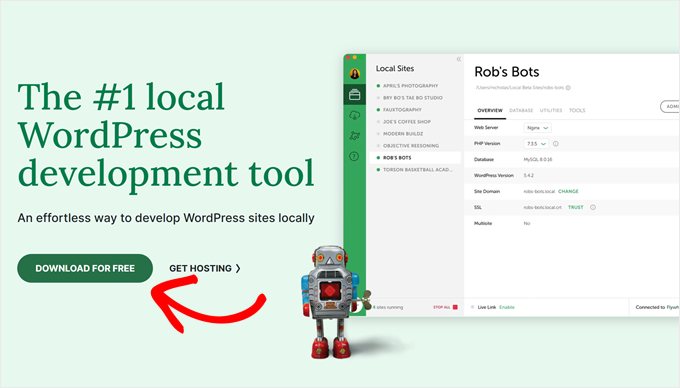
A continuación, aparecerá una ventana emergente en la que tendrás que seleccionar tu plataforma. Elige “Windows” en el menú desplegable.
A continuación, puedes introducir tus datos, como nombre y apellidos, dirección de correo electrónico laboral y número de teléfono, para descargar el software.
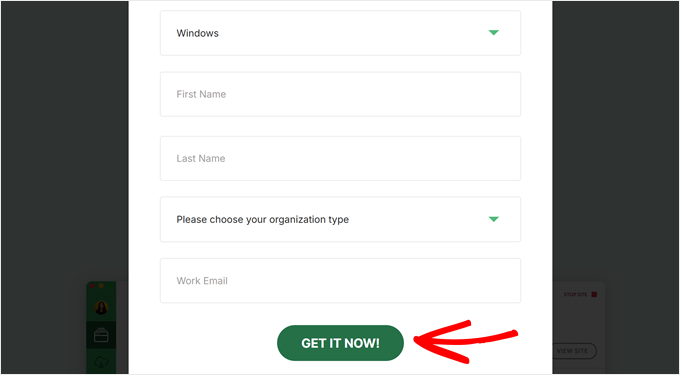
Una vez introducidos los datos, basta con hacer clic en el botón “Consíguelo ahora”.
A continuación, el software se descargará automáticamente en tu ordenador. De lo contrario, puede hacer clic en el enlace “haga clic aquí” para iniciar la descarga.
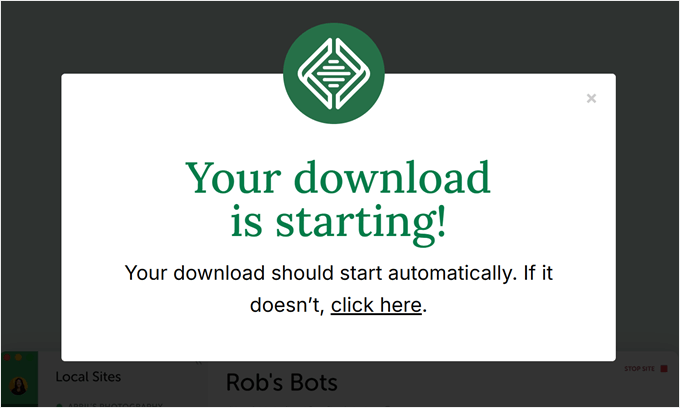
Una vez descargado el archivo, inicie el asistente de instalación.
Ahora, tendrás que seleccionar si quieres instalar el software para todos los usuarios o sólo para ti.
Una vez seleccionada una opción, pulse el botón “Siguiente”.
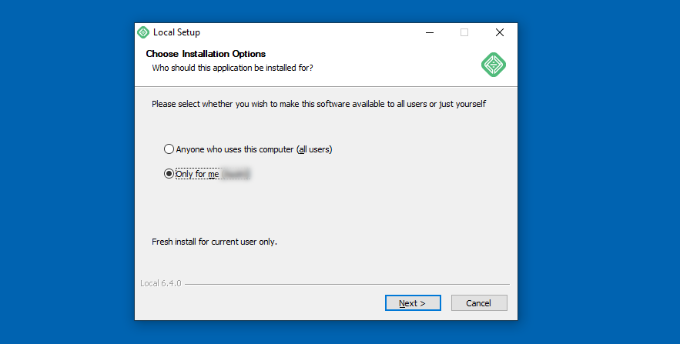
En el siguiente paso, puede seleccionar la “Carpeta de destino” donde se instalará el software.
Basta con hacer clic en el botón “Examinar” para establecer la ruta y, a continuación, hacer clic en el botón “Instalar”.
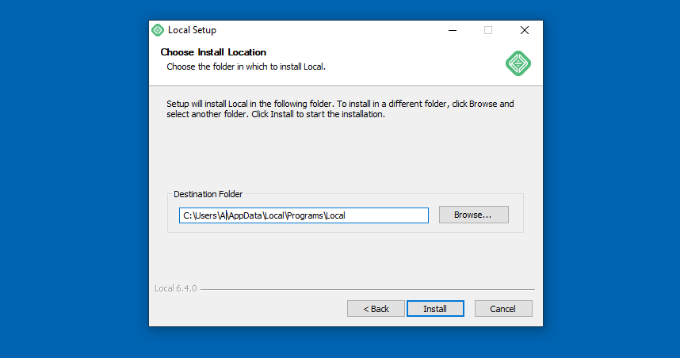
El software Local WP se instalará en tu ordenador Windows.
Una vez hecho esto, puede marcar / comprobar la casilla de verificación “Ejecutar localmente” y hacer clic en el botón “Finalizar” del asistente de configuración.
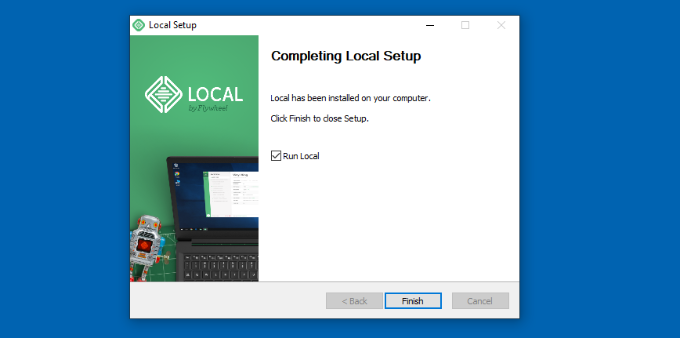
El software se iniciará ahora en su dispositivo Windows.
El siguiente paso es añadir un nuevo sitio web local. Para ello, basta con hacer clic en el botón “+” de la parte inferior.
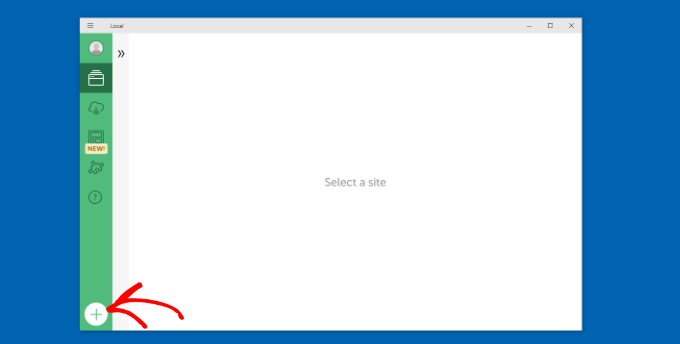
Después, puede crear un sitio en el software Local.
Seleccione la opción “Crear un nuevo sitio” y haga clic en el botón “Continuar”. También hay opciones para crear el sitio desde un plano o un archivo de sitio web existente, pero vamos a ir con la primera opción en aras de la demostración.
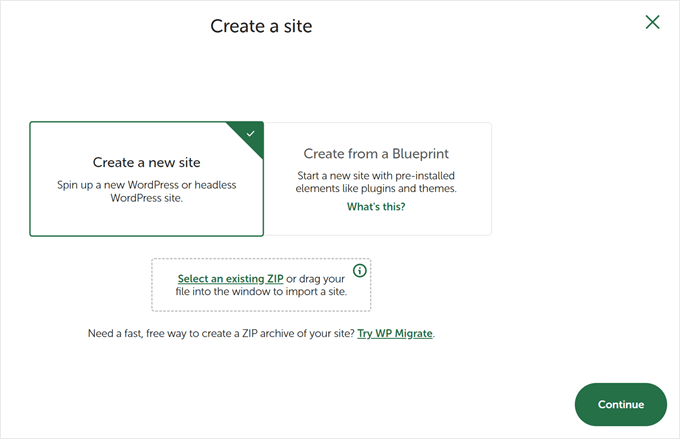
A continuación, puede introducir un nombre para su sitio web local, como “Mi sitio web WordPress”.
También hay opciones avanzadas en las que puede introducir el dominio del sitio local y la ruta del sitio local. Por defecto, el dominio utilizará el título de su sitio web, pero separado por guiones.
Una vez que haya terminado, simplemente haga clic en el botón “Continuar”.
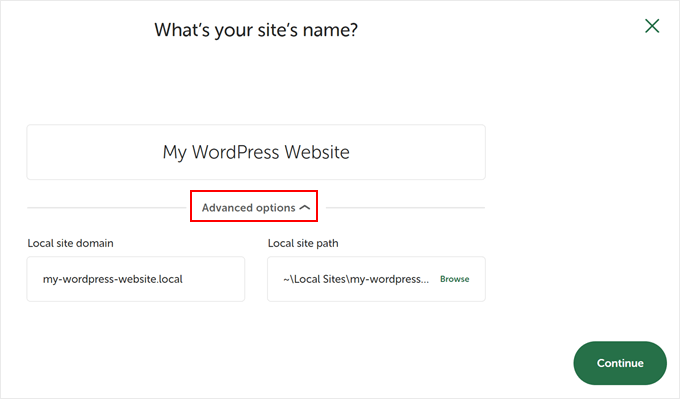
Después, tendrá que elegir un entorno para su sitio web local.
Puede utilizar el entorno ‘Preferido’, en el que el software seleccionará automáticamente la versión de PHP, el servidor web y la versión de MySQL. Por otro lado, también puedes seleccionar ‘Personalizado’ e introducir los detalles del entorno.
Local WP ofrece las últimas versiones de PHP. En cuanto al servidor web, puedes elegir entre Nginx o Apache. También puedes seleccionar entre MySQL o MariaDB para las bases de datos.
Tenga en cuenta que algunas versiones de PHP, servidores web y bases de datos requieren la descarga de algunas dependencias para que funcionen correctamente.
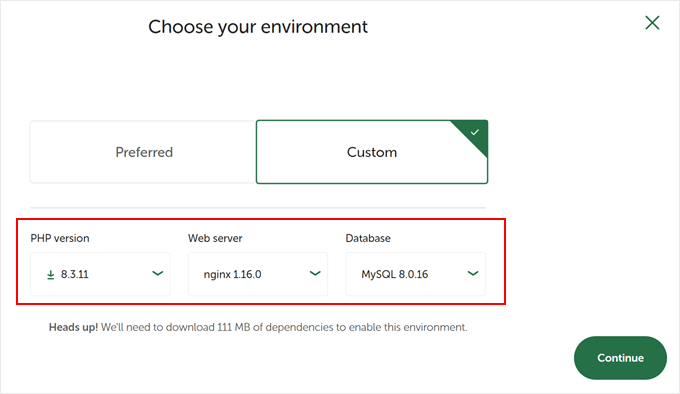
A continuación, puedes introducir un nombre de usuario y una contraseña de WordPress para tu sitio web local. Además, también tienes la opción de elegir una dirección de correo electrónico de WordPress en la que recibirás todas las notificaciones por correo electrónico.
Aparte de eso, hay una opción avanzada en la que el programa te preguntará si tienes una red multisitio de WordPress. Si no es así, haz clic en “No”.
Tras introducir estos datos, basta con hacer clic en el botón “Añadir sitio”.
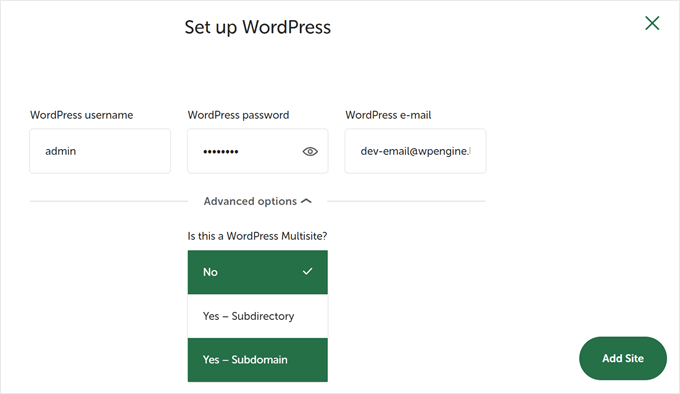
El programa instalará WordPress y establecerá su sitio web.
Para iniciar el sitio web local, haz clic en el botón “Iniciar sitio” situado en la esquina superior derecha.
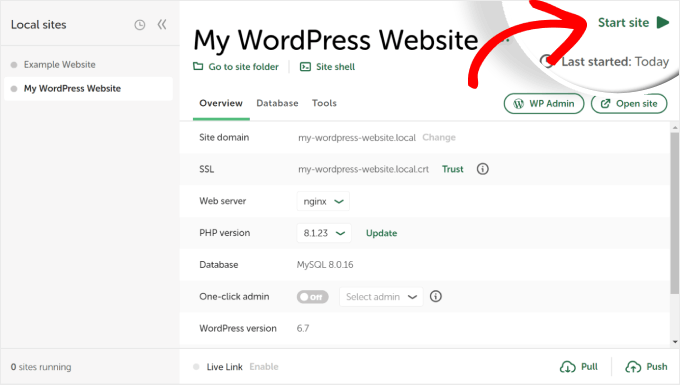
A continuación, haz clic en el botón “WP Admin” y verás la página de inicio de sesión del administrador de WordPress.
Sólo tiene que introducir el nombre de usuario y la contraseña que introdujo anteriormente al configurar el sitio web local y, a continuación, hacer clic en el botón “Iniciar sesión”.
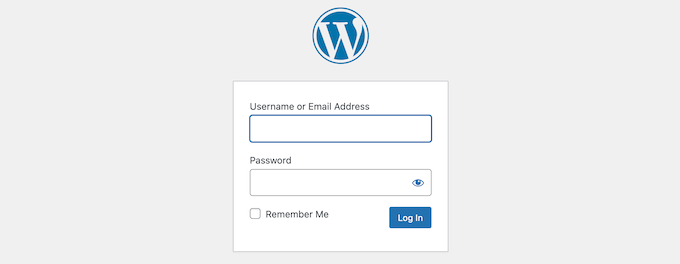
Ahora puede editar su sitio web local en su ordenador Windows.
Cuando haya terminado, no olvide detener el sitio web desde el software WP local al hacer clic en el botón “Detener sitio”.
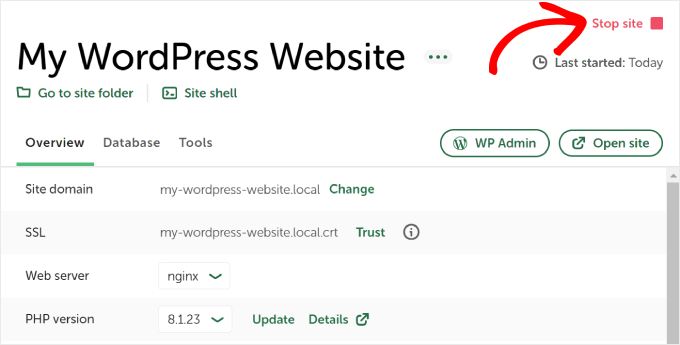
Consejo profesional: Si desea omitir el proceso de inicio de sesión, puede habilitar un inicio de sesión de administrador con un solo clic en Local WP.
Para ello, vuelve al panel de control de Local WP y activa el botón “One-click admin” hasta que aparezca “On”. A continuación, en el menú desplegable, seleccione el usuario administrador que puede utilizar esta función de inicio de sesión con un solo clic.
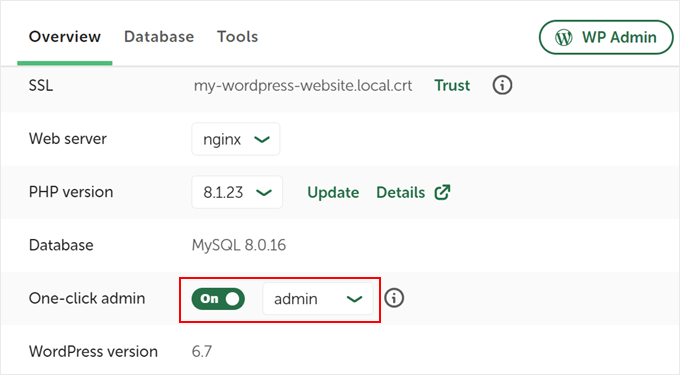
Alternativa: Utiliza WordPress Playground para probar temas, plugins y mucho más
WordPress Playground es una herramienta innovadora que te permite experimentar con WordPress directamente en tu navegador web. Es una caja de arena virtual donde puedes probar nuevos temas, plugins y funciones de WordPress sin afectar a ningún sitio web real.
WordPress Playground difiere de un entorno local de WordPress en varios aspectos clave.
En primer lugar, no requiere instalación en tu ordenador y se reinicia después de cada uso, a diferencia de las instalaciones locales permanentes. Puedes acceder a ella desde cualquier dispositivo con un navegador, mientras que las instalaciones locales están atadas a un ordenador.
Mientras que WordPress Playground es ideal para pruebas rápidas y aprendizaje, un entorno local de WordPress en su ordenador Windows ofrece más flexibilidad para proyectos de desarrollo a largo plazo.
Para obtener información detallada, consulte nuestra guía sobre cómo utilizar WordPress Playground en su navegador.
He instalado WordPress en mi ordenador Windows, ¿y ahora qué?
Ahora que ya tienes WordPress en tu ordenador, aquí tienes algunas cosas que puedes hacer:
- Aprenda trucos y consejos básicos de WordPress para utilizar mejor su sitio.
- Pruebe diferentes temas de WordPress para ver cómo puede quedar su sitio.
- Instale y pruebe los plugins imprescindibles de WordPress para añadir nuevas funciones a su sitio.
- Aprenda a solucionar errores comunes de WordPress por su cuenta.
- Pruebe diferentes creadores de páginas de arrastrar y soltar para que su sitio tenga un aspecto atractivo.
- Aprenda a restablecer la contraseña de administrador de WordPress en localhost para recuperar el acceso a su sitio.
- Establezca flujos de trabajo automatizados para facilitar la gestión de su sitio.
- Infórmese sobre la seguridad de WordPress para mantener su sitio a salvo de los piratas informáticos.
- Traslade su sitio local de WordPress a un servidor activo cuando esté listo para compartirlo con todo el mundo.
Esperamos que este artículo te haya ayudado a aprender cómo instalar WordPress localmente en un ordenador con Windows. Puede que también quieras ver nuestro artículo sobre cómo instalar WordPress localmente en un ordenador Mac y nuestra guía definitiva para crear un sitio de prueba de WordPress.
If you liked this article, then please subscribe to our YouTube Channel for WordPress video tutorials. You can also find us on Twitter and Facebook.




Thomas
Great tutorial! I’m trying to download a wordpress site to a local copy. I’ve based my self on this tutorial. So far this is what I’ve done right (I think…):
1- I’ve downloaded all the files from the live website using FileZilla to wamp/www/mysite/.
2 – I’ve exported, downloaded and zipped the live site database.
3 – Using WAMP>phpmyadmin I’ve created a new database and imported the zip file (from 2)
4- Changed the wp-config.php and updated the database name, user and password.
Now at this point, I’m able to see the homepage when I type http::/localhost/mysite. The them has been rest however. Also, the admin side as far as I can tell works perfectly.
The main problem I’m getting is that apart from the homepage I get 404 errors for all the other pages on the local site.
I’m not sure what I’m doing wrong! Thanks in advance!
George
Thanks so much. I have everything up and running. Very helpful. I would not have been able to do this on my own.
maggie
xampp is good for wordpress .It supports max range of url and all
maggie
thanks… It was helpfull and easy
karis
Been postponing this with the misconception that the process is tedious and takes time. Wow, thanks to you, I am now done. So easy. Thanks again for the good work. May it never go unrewarded.
Dmitry M
Thanks for the tut, very easy to follow.
Naaz
great..!! was as simple as 1+1 :p
Marty
Excellent, worked 110%. Thanks dude!
Bob S
This was an awesome tutorial! Thanks for the help
Faisal Masood
Thanks for sharing the nice WordPress resources.
Sabine Blackburn
Have it all installed but can not create a database in MyphpAdmin, it shows ‘No Privileges’ where the create button should be
Any suggestions?
David
After following your instructions, I got everything right except when I wanted to log in with the “root” username. When I log in, I get this message ” #1045 Cannot log in to the MySQL server”. Please what should I do?
WPBeginner Staff
Try to log in with blank password if that does not work you would need to reset root password for your MySQL server.
pran
how to change the root password
Gabriel Popov
Thanks, this article was really useful.
Omar
Amazing!! thanks a ton!!
Aaron
Downloaded everything. I can access wordpress but need to create a database for wordpress. When i click on phpmyadmin it takes me to a 403 forbidden error saying You don’t have permission to access /phpmyadmin/ on this server. I cant figure it out.
Annie L
Hello – your tutorial rocks. I’m able to get pass the 5 min setup and land on the WordPress login page.
One issue, after entering the same credentials provided in the 5-min setup (/wordpress/wp-login.php), I get “SSL connection error.”. Looking at the wp-login.php file, it forces a redirect to SSL.
How do I get around it without installing a SSL locally?
Running Wamp 2.4, Windows 7, Chrome browser.
lubna
really help tutorial bro.I just cant log in to word after the successful installation Help.
Miriam
I think your tutorials are clearer than anything else I find for a newbie like me. Thanks!
Can you offer any suggestions for my problem creating a database? I already have a WP site under Bitnami. I decided to download WAMP to have multiple WP sites using WAMP. After installing WAMP, when I open phpMyAdmin I get a log in window. If I log in using the username/pswd originally set up (with Bitnami installation) it says I don’t have priveliges to create a database. I can log into phpMyAdmin using the usename/pswd from the Bitnami WordPress site and I have priveliges but it gives me a 1044 Error when I try to create a new database. I am not sure what to try next. Thanks in advance for any suggestion you may have.
Miriam
I figured out that problem and am on to a different problem. After installing WAMP and putting WordPress in c:WAMP/WWW… I open a browser and try http://localhost/mysite/ but get a 404 Not Found. Could this be related to the fact that I already have Bitnami/localhost? Thanks!
Win
You didn’t paste it in the www folder. You can’t post it in the main wordpress file — you have to navigate to the www folder and paste it next to the index.html file. This should fix your 404 error problem
Merom
Hi,
I am facing the same problem. what exactly should I paste to www?
thanks
IBAS
I really found this tutorial so helpful to me, thanks for the efforts
Kriss
Wamp Server is an outdate program died on 2013. Probably it is not the best for wordpress
Laurent Lafont
You are not saying what the username and password are when launching phpmyadmin! And all web searches are giving dummy information as well….. So now stuck…. very useful instructions indeed…….
Win
Username: Root
Password: Blank
Helen Magner
Thanks for the instruction. It worked well. I have had a wordpress site up and running for a year now. but now but I would like to be able to import it to to local site so that I can write and save wile I cannot connect to the internet and publish when I can get back on line. Thanks for your help.
ludovic
Simply perfect. Merci !!!
Robert
When i follow the steps wampserver to myphpadmin I get the login page, not the page which allows me to click on the database tab as shown in your very well written tutorial. Suggestions to get the wp-config.php file set up?
Dave
I had the same problem, just leave the password blank & you’ll get in.
Psdfreak.com
On that login page fill Username: “root” and press login (no password required)
Maryam Jamil
thanks alot
your article really helps
Dharmesh Joshi
Thanks you bro…(Y)
Vivi
Hey! Really helpfull article, But… I can’t log in in wordpress..Firstly , in the step of installing wordpress i was directed in a blank page( logo only) , then i reloaded and said it has allready been istalled, so i procceded with the log in, but it seems that my account is not valid..nothing workd..not even the e-mail for getting a new pswrd .
What should i do? I allready copied the steps twice from the beggining with different databases and data.
nel
your tutorial worked PERFECTLY
ty
Andy
Please help . Thanks
installed WAMServer, as according to your instructions, I chose phpMyadmin, and I encountered this error msg, “HTTP Error 404.0 – Not Found
The resource you are looking for has been removed, had its name changed, or is temporarily unavailable.
Detailed Error Information
Module IIS Web Core
Notification MapRequestHandler
Handler StaticFile
Error Code 0×80070002
Requested URL http://localhost:80/phpmyadmin/
Physical Path C:\inetpub\wwwroot\phpmyadmin\
Logon Method Anonymous
Logon User Anonymous”
I installed and re-installed WAMServer, but encounter the same error, how do I proceed from here?
farah
Hi, Thank you for great tutorial, I am facing an issue please help me to solve the issue. After successful installation of WAMP, when I have clicked on PhpMyAdmin , It is asking me to login , but i dont know what is my username and password that can be used here?
Regards
Farah
WPBeginner Support
Try username root and leave password field blank
Admin
Barbara
I had the same error and other sites had very complicated and, frankly, unsuccessful suggestions on how to fix it. Thank you for this clear and simple solution – it worked!
KarSho
Simple, Clear and Helped.
Thanks Dude…
zubekk
thanks dude………..!
Sara
Hey there! I installed WampServer like you said but when i press phpmyadmin it opens a blank chrome webpage. No database menu or anything like the printscreen you showed. it’s just blank. I’ve tried unistalling and installing again but it remains the same. help!
WPBeginner Support
Where do you press phpMyAdmin? Try accessing it using the url http://localhost/phpmyadmin/
Admin
Sara
I pick the WampServer icon out of the taskbar and pick the phpmyadmin just like in your printscreen. No, that didn’t work either. I don’t know what can be wrong!
Sara
Ok, reboot the system and It opened something on the phpmyadmin but it’s asking me login and password!
Omer
Hi. Although this article is helpful, however I would like to give some suggestions in improving it. There are some fill in the blanks in this article which makes it difficult to install wordpress.
1. After instructing on installing Wamp Server 2, you immediately jump to phpmyadmin where as you should have told that we need to install mySQL -service- install service and start it. Then we have to install apache – service – install service and start it. Then after making sure that the wamp icon is green head over to the phpmyadmin.
2. After opening the localhost site, you didn’t mention that the username was “root” and password was blank for the database site and jumped immediately on creating database through database tag.
Apart from that it was great effort.
hujat ul islam
can you help me in installing word press on xampp
sumit
while installing wamp server it wll shows error again and again.. . error is about MSVC3100.dll file error.. . kindly fix this error
LIsa
I installed wamp successfully, renamed database, installed wordpress, entered all fields and then once I hit the final “install wordpress”, got a weird blank screen with the wordpress logo at the top. When I hit the “back button” it said wordpress was already installed so I tried entering the username and password and it says it is not found. I tried entering the email I had entered to reset the password and says it isn’t found. I tried using the instructions above for changing the password within the phpmyadmin found the Wp-users file in my database and clicked on pencil icon to edit users and it says “my sql returned an empy result” … help!
Lisa Tomsio
Never mind … I just deleted wordpress installation, created a new database and started over and it worked. I had unchecked the “allow search engines …” on the wordpress page the first time so I left it checked the second time and it worked fine. Thanks for this information!
Campbell
I installed WAMServer, as according to your instructions, I chose phpMyadmin, and I encountered this error msg, “HTTP Error 404.0 – Not Found
The resource you are looking for has been removed, had its name changed, or is temporarily unavailable.
Detailed Error Information
Module IIS Web Core
Notification MapRequestHandler
Handler StaticFile
Error Code 0x80070002
Requested URL http://localhost:80/phpmyadmin/
Physical Path C:\inetpub\wwwroot\phpmyadmin\
Logon Method Anonymous
Logon User Anonymous”
I installed and re-installed WAMServer, but encounter the same error, how do I proceed from here?
yousef mayeli
hi there
i installed many times with different options but same problem,it’s icon appears and when i click it to proceed it doesn’t appear anything. i don’t know what should i do.just disappointed
yousef mayeli
i installed wamp and its icon came on desk but when i click on it doesn’t open i even went to my skype and changed but didn’t affect anything , thanks
. guide me
WPBeginner Support
Try installing WAMP again.
Admin
sumit
while installing wamp server it wll shows error again and again.. . error is about MSVC3100.dll file error.. . kindly fix this error
please help meee….
Kevin Salt
Good article … Thanks.
I don’t want to nit-pick but I think you’re missing a semi-colon in the Skype section …
“and go to Tools » Options. Click on Advanced and then Connections.”
——————-> »
al b
I seem to be hung up on the http://localhost/mysite/ I get a 404 Not found error.
Al B
Disregard. I overlooked renaming the WP directory when moving to www. Thank you for this tutorial!
WPBeginner Support
make sure you have WordPress installed there. Make sure your WAMServer is running.
Admin
Kenia
I had just installed WAMP and then had no idea how to proceed from there as there is no manual for WAMP. This and the next article on making the wordpress site live are both lifesavers. Seriously. THANK YOU for writing this for beginners, and not assuming we know things we don’t (I see that a lot with experts: they take their knowledge for granted and forget what it’s like to start out and not know things).
THANK YOU, THANK YOU, THANK YOU!!!
Martin
Hello Guys, all done.. no matter what I am doing.. still last step freezes. I see only WP white-blue logo and white unloaded text box. After typing my website I get: “Error establishing a database connection” error. Any ideas? Cheers.
Chris
Thanks so much for this! Successfully installed. Only problem I ran into was with the wp-config.php file. I needed to open the copy of wp-config-sample.php, make changes on my own and then save. Other than that, easy install.
Amelia
When I went to click on “create database” in phpmMyAdmin, it said “X No privileges”. What did I do wrong?
Amelia
No matter, I got that fixed. Now I’m just stuck on the configuration page, info filled out and hit submit but the install wordpress page never comes up!
om gupta
in my laptop wamp server is not working in the local user account .it work only in administrator account but i want to run wamp server in local user account because i do not have administrator access right pls help me how can i run wamp server in my local user account.
WPBeginner Support
Without administrator rights it would be difficult for you to run wamp.
Admin
Ratan
Hi ,
I followed the complete step and dowloaded the WP and started uploading theme . With my first theme only , I got the below message after tryin to install the same :
The uploaded file exceeds the upload_max_filesize directive in php.ini.
Please guide .
Regards ,
WPBeginner Support
Please check out this guide: How to increase the maximum upload size in WordPress
Admin
utpal
after install Wampserver i go to phpmyadmin, inthin a login option is here
where i get pass and id
WPBeginner Support
Try root for username and leave password blank.
Admin
Tony Leary
Same problem – that works. Thanks.
Alan
Hello again,
Per my last comment, I think I figured it out. Sorry for the bother.
Alan
Thanks for the write-up! Wondering if you might have any ideas as to why I cannot create a db from phpmyadmin? After clicking “databases” to create a db, I get a “loading” message for quite some time, then that disappears & nothing…
The same occurs no matter which tab I select in the phpmyadmin dash. Been Googling for over an hour & I haven’t been able to find a solution. Thanks again!
WPBeginner Support
Try uninstalling and then reinstalling WAMP server. If that does not help you can also install XAMPP.
Admin
Maureen
Hi Guys! Step by Step Wonderful! Installed WAMP successfully, set up database, downloaded wp with no problem Sucess! now log in… user name or password invalid… press here to have password sent via email… i receive this message “The e-mail could not be sent.
Possible reason: your host may have disabled the mail() function.” any help is appreciated!
WPBeginner Support
Check out our guide on how to reset a WordPress password from phpMyAdmin
Admin